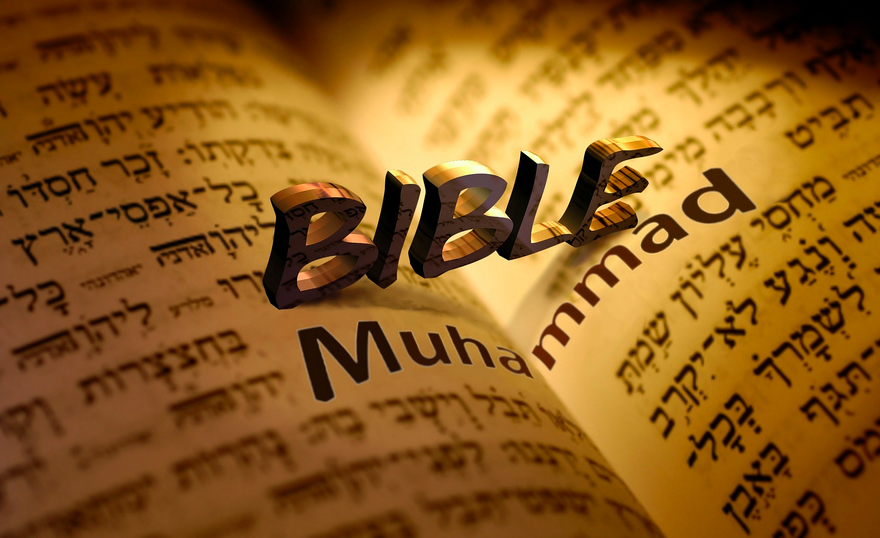In this article, I continue my response and rebuttal to Asif’s note on my article. If you have not read the first part, you can read it here. Asif made an attempt to compare the three verses I gave (Quran 7:82 & 27:56 vs 29:29) on the difference in the responses of the people of Lot. He made the following interesting comments;
First key thing to note is that mere presence of different words or response is no real concern for Muslims. These 2 verses can easily be reconciled that when prophet Lot preached to them, their only response was that bring us the wrath of Allah or we will drive you out of the city. This doesn’t present any real contradiction. Real concern would have been when real different, contradictory and problematic story was identified. Currently, it is not the case with Story of Lot.
[Bold emphasis mine]
Please note what Asif has done in making an attempt to solve this problem. Harmonization! You see, when Christians harmonize scriptures and eventually show that there is no contradiction when authors use different style in reporting the happenings of the life of Christ, Muslims sees this as an attempt to reconcile an obvious contradiction. Yet, this is the exact same thing Asif is doing here. By the way, one of the contributors of the website, brother Oyebola had written an excellent article on harmonization, interested may want to read it here.
To make this more obvious, let me break it down. Asif took these accounts, and harmonized it to create a story that does not exist in the Qur’an just to remove any form of contradiction in them. Here is what he did.
He took the response in Quran 7:82 and Quan 27:56 which in summary says “we will drive you out of the city” and then merged it with Quran 29:29 which says “bring us the wrath of Allah”.
What a nice move of harmonization. The problem is that, when Asif sees something like this in the Bible, he calls it a contradiction, but when they surface in the Qur’an he says there is no problem and can easily be reconciled.
Noticing that this not a satisfactory answer and can easily be dismissed, Asif went further to explain;
Quranic verse 29:29 is when Prophet Lot was preaching to them BEFORE THE ARRIVAL OF THE ANGELS and they said to bring us the torment. Prophet Lot would have surely preached to them multiple times before coming of angels of destruction and this was their only response to Lot. This is confirmed in Quran 54:36 Quran 54:36. And (Lut) did warn them of Our Punishment, but they disputed about the Warning.
As seen in this response, Asif’s way of solving the problem is to claim that Quran 29:29 happened before the Angel came wherefore the people responded, “bring us the torment”. This at it best a gymnastic move that does not lead anywhere. What Asif is trying to do is to tell us that the event of the conversations between Lot and his people are not the same, and does not happen at the same moment.
I don’t doubt the fact that Lot would have conversed with his people multiples time before this, but to claim that this event is not the same as, therefore, a reporting of two different incident is illogical and does not follow.
Asif confirmed this by saying;
And Quranic verses 7:82 and 27:56 was when they discussed among themselves to cast Prophet Lot out of the city WHICH HAPPENED AFTER THE ARRIVAL OF ANGELS. We then see Lot ordered by angels to move out of the City as torment of God was about to start in the morning and not to look back. In this way also both stories are easily reconciled without any supposed contradiction. Accordingly, these represents 2 different events rather than one. And thus they both can be easily reconciled without any contradiction.
So, we notice Asif is trying to split the event into two separate conversations. First, the event of Quran 29:29 which took place BEFORE the arrival of the Angels, and the event of (Quran 7:82 and 27:56) AFTER the arrival of the Angel. This is not only a vain move, but clearly a desperate one as we shall see shortly.
Here is another problem. A careful reading of the text shows that they are the same event with the same timing and not one happening before or after the event as Asif suggested. I guess Asif was confused by the way the Quran presented the stories, as the Quran is mostly chronological incoherent. I will prove my case by presenting two verses to show this.
In Quran 29:28-29 we read;
29:28
And [mention] Lot, when he said to his people, “Indeed, you commit such immorality as no one has preceded you with from among the worlds.29:29
Indeed, you approach men and obstruct the road and commit in your meetings [every] evil.” And the answer of his people was not but they said, “Bring us the punishment of Allah , if you should be of the truthful.”
Please pay special attention to verse 28. It gives us the words of Lot and how he accused his people of immorality. Also notice that the first part of verse 29 mentioned how that they approached men! Now, with that in mind, we read Quran 27:54-55;
27:54
And [mention] Lot, when he said to his people, “Do you commit immorality while you are seeing?27:55
Do you indeed approach men with desire instead of women? Rather, you are a people behaving ignorantly.”27:56
But the answer of his people was not except that they said, “Expel the family of Lot from your city. Indeed, they are people who keep themselves pure.”
Do you notice the striking similarity? How Asif came to the conclusion about this before and after explanation is still a wonder. I understand he is trying to get around this obvious problem. So, as we have seen, this does not solve the problem either and his argument fails on this ground we well.
Since these two responses have failed, let’s examine Asif’s next response on this matter. He went further to say;
i) Response as mentioned in verse 7:82 & 27:56 WAS PEOPLE OF THE COMMUNITY SPEAKING TO EACH OTHER to drive out prophet Lot. They were calling each other and planning to drive out Prophet Lot (pbuh).
ii) Response as mentioned in Quran 29:29 WAS PEOPLE SPEAKING TO PROPHET – LOT to bring out God’s wrath. Here they were speaking to Prophet Lot (pbuh) and not to each other. This is how these passages of the Quran are reconciled and there is no contradiction whatsoever.
We see from this response, a very desperate attempt by my friend Asif to reconcile the issue. He postulated that while one verse is indicating that the people were “speaking to themselves”, the other verse suggested they were responding to Lot. How clever this is. But here is what Asif did not take note of. The two verses say they gave a response, then Allah goes on to relate their response. The question is, who were they RESPONDING TO?
Would it not be absurd to say they are responding to themselves, knowing fully well that there was a conversation going on? Who were they giving the answer to? This in and of itself does not suggest that these are two different responses to two different matters, but two different responses on just one issue.
I can understand the struggles of Asif, given that he has accused the authors of the Bible erroneously and has concluded that since the Gospel writers wrote from different perspective, it must mean they are not inspired and not then the word of God. Now faced with the same problem in the Qur’an, he has to look for ways to salvage the matter. Regardless of the way, shape or form attempted by him, this is a clear example of holding double standards.
Asif also addressed my note on one verse saying it was an old woman that was mentioned, while another verse on the same incident mentioned it was Lot’s wife. He asserts;
His second concern is that the certain Quranic verses mention WIFE / PARTNER while Quran 26:170-171 mentions “Old Woman”. (Quran 7:83, 29:33, 15:60, 11:81 vs 26:170-171) This issue is very easily reconcilable and Korede himself affirms it. His note confirms that there is no contradiction and it can be easily reconciled in that Lot’s wife was an old woman.
Asif wasn’t necessarily aware of the reason why I brought this up. Although I mentioned it as a side note, it is of significant interest. If this were to be in the Gospel, Asif would have been quick to say this was an evolution. Given that if the word ‘Lord’ is used in a narration and another used ‘God’, then, a tampering has taken place. This is the very point I am trying to pass across.
I wanted to show Asif that if I were to treat the Qur’an the way he treats my Bible, I could come up with lots of various problems in the Qur’an.
Asif continued by addressing my point about the wife of Lot in the whole incident. He writes;
His third claim is that it wasn’t the woman who intentionally lagged behind, but it was Allah’s intentional plan as per Quran 15:60. I however disagree to such interpretation done by Mr. Korede. God Almighty already knows who is a believer and who is a disbeliever as God is all-knowing. Mr. Korede being a believer should avoid such interpretation of the scripture as same when applied to Bible would create more problems for him. Allah didn’t intentionally made her lag behind. She was a disbeliever and such is clearly mentioned in Quran 66:10
Quran 66:10 Allah sets forth, for an example to the Unbelievers, the wife of Noah AND THE WIFE OF LUT: they were (respectively) under two of our righteous servants, BUT THEY WERE FALSE TO THEIR (HUSBANDS), and they profited nothing before Allah on their account, but were told: “Enter ye the Fire along with (others) that enter!”
When I hinted at the problem of these two verses, one of the verses suggested that the wife of Lot stayed behind, while the other indicated that Allah was the one who made her stay behind. Asif accused me of a false interpretation. Well, I did not interpret the verse falsely, I only postulated what is represented in the text. Lets examine it together again.
“Except his wife, of whom We have decreed that she shall be of those who remain behind (i.e. she will be destroyed).”
[Qur’an 15:60]
This verse in and of itself is very explanatory. That Lot’s wife didn’t just stay back voluntarily. How would you explain this that someone who though might be evil desired to be left behind for destruction? The verse shows that Allah had destined her to be destroyed.
Actually, the arabic word for “we have decreed” is “qaddarnā”. It suggest that this is what Allah has planned for her even though she is evil. Allah does not want her to escape the destruction. So, one one verse is showing her as though she willingly stayed behind. The other verse shows us that it was because she has been marked for destruction, that she was forced to stay behind.
How do I know this? This is exactly what was said in Quran 27:57 which reads as follows;
So We saved him and his family, except for his wife; We destined her to be of those who remained behind.
Did you catch that? Allah said that he has “destined” her for destruction that is why she remained behind. Interestingly, the word used there is the arabic word qaddarnāhā. So instead of Asif accusing me of misinterpreting the text, I suggest he does a holistic exegesis of the verse of his own scripture.
Finally, Asif tried to mitigate the problem I brought forth regarding whether Lot’s wife moved on with his wife and was later destroyed or that she did not make a move at all. In an attempt to explain this, he said;
Another point raised by Korede is whether Lot’s woman ran with Lot or she lagged behind. This is also pretty easily reconcilable. She ran (or tried to run) along with Lot, but as she was an old woman, she lagged behind, turned and saw backwards and thus was destroyed. There is absolutely no problem at all.
Unfortunately for Asif, I am not the only one who has brought up the problem. As I mentioned in my article, the Muffasirun were also divided on this matter as it did not escape their attention, I am not sure Asif read that part of my article. For the sake of clarity, here is the argument again and the issue Asif failed to address.
We read according to Quran 11:81 that Lot’s wife actually left with Lot, but was destroyed on the way. This is against the narratives that suggested that she did not go with Lot and his daughters.
They (Messengers) said: “O Lout (Lot)! Verily, we are the Messengers from your Lord! They shall not reach you! So travel with your family in a part of the night, and let not any of you look back, but your wife (will remain behind), verily, the punishment which will afflict them, will afflict her. Indeed, morning is their appointed time. Is not the morning near?”
[Qur’an 11:81]
Now, as a way to back up what I have said, I quoted the Tasir from Al Jalalayn on this matter. The Tasir shows clearly that this meant that while some hold to the fact that she eventually went out with Lot and on the way looked back and got destroyed, others suggested that she did not set out and was destroyed with the people.
“They said ‘O Lot truly we are messengers of your Lord. They shall not reach you with any harm so travel with your family during a part of the night and let not one of you turn round lest they see the terrible predicament that will befall them except for your wife read illā imra’atuka in the nominative as a substitute for ahadun; a variant reading has illā imra’ataka in the accusative as her being an exception among his ‘family’ in other words do no take her along when you travel lo! she shall be smitten by that which smites them it is said that he did not take her along with him; it is also said that she did set out with them and turned round and so exclaimed ‘Woe is my people!’ at which point a stone struck her and killed her. When he Lot asked them about the time of their destruction they replied Truly their tryst is for the morning and when he said ‘I want it to be sooner’ they said is the morning not nigh enough?’”
[Tafsir Aljalalayn on Qur’an 11:81]
This narration dispels the attempt by Asif to create a scene that this is not problematic at all. I can understand the fact that Asif is trying to make his own commentary since the one I cited does not favour his argument. This is the problem you get into when you maintain double standards.
As we have seen, this is not as simple as Asif made it to be. It is either Asif accepts the fact that there are differences of opinion on this verse which is as a result of the text itself, therefore conceding to the difficulties the verse presented or ignore it altogether and pretend as if there was no issue at all – so he does not have to deal with anything.
What is clear in all of these is, while the Gospel authors wrote from their perspectives and for their audience, they are being accused of changing and making an evolution. When we however see the very same in the Qur’an (which unfortunately Muslims claim was from one author), it becomes very problematic. Are we to suggest that there are multiple authors of the Qur’an? Or are there more to the stories when investigated for inconsistencies as we have seen?
I quite appreciate Asif for his response, as this has provided me an opportunity to further cement my point on this matter. His response has also enabled me to further defended the narratives as depicted in the Gospel. Furthermore, it has also shown that the Qur’an has an inherent problem that the Muslims might have to struggle with especially when accusing the Gospel writers of inconsistencies.
I hope this has been beneficial to both my Christians and Muslims friends, and will ultimately push the conversation forward.



